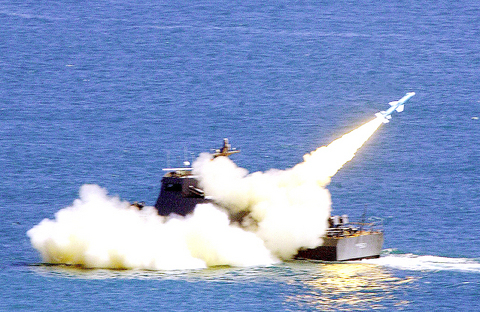China chastised President Chen Shui-bian (陳水扁) yesterday for his recent pro-independence comments, calling them a dangerous move that could cause further decay in ties between the two rivals.
Chen on Sunday told a pro-independence group that the nation should be independent and have a new constitution.
The comments were "a dangerous step forward," the Taiwan Affairs Office of the State Council said in its first official response.

PHOTO: SAM YEH, AFP
"It indicates that Chen wants to sacrifice the interests of the Taiwanese people," said the statement, which was read on state television's evening newscast.
"[Chen's] purpose cannot be achieved," it said. "China will continue to be committed to developing cross-straits relations but will never allow Taiwanese independence and secession and Taiwan's split from the motherland."
The statement came as China's top general said the nation's military would block any attempt by Taiwan to formalize its independence.
General Guo Boxiong (
It said Guo's comments were made at a discussion with military delegates to the national legislature on Monday.
Guo, a vice chairman of the government and Communist Party's Central Military Commission, ranks second only to Chairman Hu Jintao (胡錦濤), who is also China's president.
Guo also urged all PLA soldiers and officers to further "heighten [their] sense of responsibility and sense of urgency," and to make all-out efforts to "get well-prepared for military struggle," familiar exhortations that did not appear directed at recent events.
Just hours before Chen spoke on Sunday, China announced a 17.8 percent boost in its military spending, which is largely oriented toward Taiwan. The increase to 350 billion yuan (US$45 billion) was the biggest jump in more than a decade, although Washington believes the figure could be much higher.
The US, Taiwan's chief ally and military supplier, has said China faces no outside military threats. The US has questioned the reasons for the military buildup and called for greater transparency from the China's armed forces.
Chen's comments also drew a response from the US State Department, which reminded him of his pledges not to alter the status quo.
"Rhetoric that could raise doubts about these commitments is unhelpful," spokesman Sean McCormack said.
also see story:
Chen's weekend comments upset US

ENDEAVOR MANTA: The ship is programmed to automatically return to its designated home port and would self-destruct if seized by another party The Endeavor Manta, Taiwan’s first military-specification uncrewed surface vehicle (USV) tailor-made to operate in the Taiwan Strait in a bid to bolster the nation’s asymmetric combat capabilities made its first appearance at Kaohsiung’s Singda Harbor yesterday. Taking inspiration from Ukraine’s navy, which is using USVs to force Russia’s Black Sea fleet to take shelter within its own ports, CSBC Taiwan (台灣國際造船) established a research and development unit on USVs last year, CSBC chairman Huang Cheng-hung (黃正弘) said. With the exception of the satellite guidance system and the outboard motors — which were purchased from foreign companies that were not affiliated with Chinese-funded

PERMIT REVOKED: The influencer at a news conference said the National Immigration Agency was infringing on human rights and persecuting Chinese spouses Chinese influencer “Yaya in Taiwan” (亞亞在台灣) yesterday evening voluntarily left Taiwan, despite saying yesterday morning that she had “no intention” of leaving after her residence permit was revoked over her comments on Taiwan being “unified” with China by military force. The Ministry of the Interior yesterday had said that it could forcibly deport the influencer at midnight, but was considering taking a more flexible approach and beginning procedures this morning. The influencer, whose given name is Liu Zhenya (劉振亞), departed on a 8:45pm flight from Taipei International Airport (Songshan airport) to Fuzhou, China. Liu held a news conference at the airport at 7pm,

AIR SUPPORT: The Ministry of National Defense thanked the US for the delivery, adding that it was an indicator of the White House’s commitment to the Taiwan Relations Act Deputy Minister of National Defense Po Horng-huei (柏鴻輝) and Representative to the US Alexander Yui on Friday attended a delivery ceremony for the first of Taiwan’s long-awaited 66 F-16C/D Block 70 jets at a Lockheed Martin Corp factory in Greenville, South Carolina. “We are so proud to be the global home of the F-16 and to support Taiwan’s air defense capabilities,” US Representative William Timmons wrote on X, alongside a photograph of Taiwanese and US officials at the event. The F-16C/D Block 70 jets Taiwan ordered have the same capabilities as aircraft that had been upgraded to F-16Vs. The batch of Lockheed Martin

GRIDLOCK: The National Fire Agency’s Special Search and Rescue team is on standby to travel to the countries to help out with the rescue effort A powerful earthquake rocked Myanmar and neighboring Thailand yesterday, killing at least three people in Bangkok and burying dozens when a high-rise building under construction collapsed. Footage shared on social media from Myanmar’s second-largest city showed widespread destruction, raising fears that many were trapped under the rubble or killed. The magnitude 7.7 earthquake, with an epicenter near Mandalay in Myanmar, struck at midday and was followed by a strong magnitude 6.4 aftershock. The extent of death, injury and destruction — especially in Myanmar, which is embroiled in a civil war and where information is tightly controlled at the best of times —